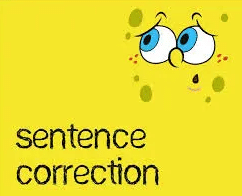Theory
Connectivity of verbs: When a group of verbs is connected to a noun in the same sentence, the tense of the verbs should be consistent. For example, 'My kid brother cries, eats and sleeps all day long' is correct and it should not be, 'My kid brother cries, eats and is sleeping all day long.'

Tips
Take a note of the following words to avoid common grammar mistakes.
- It’s – Short form of it is or it has
- Its – Possessive form of it
Their vs They’re vs There
- Their – Third person plural possessive adjective. Used to indicate something that belongs to ‘them’.
- They’re – It’s a contraction of “they are”.
- There – Used to indicate “that place”. Opposite of here. Can also be used as a pronoun to introduce a noun or clause.
Solved Example
Direction: In the following question, out of the four alternatives, select the alternative which will improve the bracketed part of the sentence. In case no improvement is needed, select no improvement.
Question for Cheatsheet: Grammar Sentence Correction
Try yourself:"The people of Japan are (wiser than America)."
Explanation
There is a comparison between people of Japan and people of America. Since the comparison is between plurals, “those of” will be used instead of “than of” which is used with singular.
Report a problem
Question for Cheatsheet: Grammar Sentence Correction
Try yourself:"I absolutely must (seen) him, however painful it may be for me."
Explanation
Must should be followed by a verb in simple present. Hence, the answer should be "must see".
Report a problem
Question for Cheatsheet: Grammar Sentence Correction
Try yourself:"He (to be) positively rude."
Explanation
The sentence is in the past tense, indicated by the verb "to be." The correct form of "to be" in the past tense for "he" is "was." Additionally, the continuous form of the verb ("being") is needed to describe an ongoing action in the past. Therefore, the correct phrase is "was being." The sentence should read, "He was being positively rude."
Report a problem
Question for Cheatsheet: Grammar Sentence Correction
Try yourself:Improve the bracketed part of the sentence.
"By rescuing the child from fire, the local resident (added another feather to his cap)."
Explanation
The phrase 'added another feather to his cap' is an idiom that means to accomplish something noteworthy, adding to one's reputation or list of achievements. The most accurate improvement is 'made a significant achievement' because it directly reflects the idiomatic meaning. The other options do not capture the sense of having achieved something notable.
Therefore, option e is correct.
Report a problem
Question for Cheatsheet: Grammar Sentence Correction
Try yourself:"She glanced back to make sure she (wasn't to be) observed."
Explanation
The sentence is in past progressive passive form and hence being is used with the past participle.
Report a problem

















